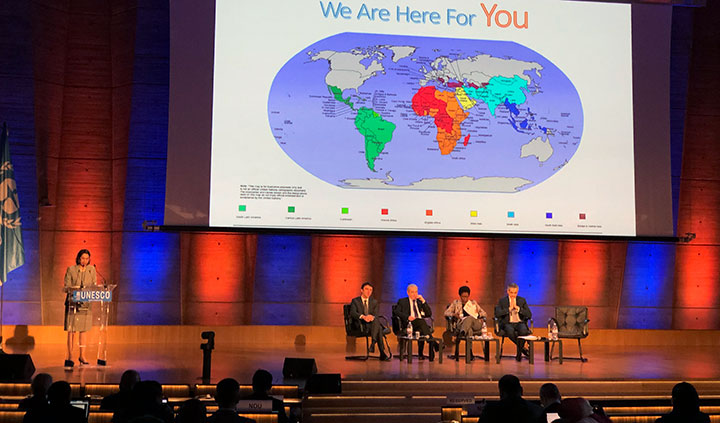ASHRAE Tools for Capacity Building Described
OzonAction Officers Review Progress on Meeting Montreal Protocol Requirements
From ASHRAE HVAC&R Industry News, February 21, 2019
By W S Comstock, Contributing Editor, Europe & Middle East
PARIS—UN Environment convened the Second OzonAction Global Inter-Regional and Parallel Networks Meeting for National Ozone Officers, February 18 to 20.

Dr. Shamila Nair-Bedouelle (left), head of OzonAction, speaking.
UNEP, through the OzonAction Compliance Assistance Program (CAP), works with all 147 Article 5 countries as an Implementing Agency of the Multilateral Fund of the Montreal Protocol on Substances that Deplete the Ozone Layer. UNEP’s CAP elaborates on and enforces the policies required to implement the Protocol, make informed decisions about alternative technologies, and implement approved phaseout projects, all of which enable compliance with obligations under the multilateral agreement.
“Our objective is to continue this highly successful partnership with National Ozone Officers to address emerging needs under the HCFC phaseout and to prepare for the ratification and initial implementation phase of the Kigali Amendment, which entered into force on January 1,” said Dr. Shamila Nair-Bedouelle, Head of OzonAction.
Ozone Officers from all nine OzonAction regions attended. According to Dr. Nair-Bedouelle, the session was intended to facilitate the sharing of experiences and to review the progress made in the regions with regards to the implementation of the Montreal Protocol. “The event was designed around several themes,” she said. “Preparing countries to meet the 35% HCFC phaseout target and compliance monitoring; Exploring the link between the ongoing HCFC phaseout and the HFC phasedown; Considering data reporting requirements, data collection strategies and data monitoring; Reviewing legislation, licensing and quota systems to address Kigali Amendment requirements; and Strengthening enforcement strategies to control trade in HCFCs/HFCs and combating illegal trade,” she said.
Besides individual meetings of the Regional Networks of Ozone Officers, “Join the Expert” sessions were organized with six parallel sessions. Experts from Article 5 countries, Secretariats, Implementing Agencies, as well as international experts and institutions interacted with Ozone Officers on specific subject areas.
ASHRAE was among the UNEP partners that participated. ASHRAE representatives described ASHRAE-produced tools available for use by the OzonAction officers. They include the Refrigerants Literacy eLearning Course, Sound Management of Refrigerants eLearning Course, and Refrigerant Management Full Semester University Course.
The Montreal Protocol on Substances that Deplete the Ozone Layer successfully phased out ozone-depleting substances (ODS). With the Kigali Amendment, the international community has set its sights on hydrofluorocarbons (HFCs). HFCs can have a much greater impact on climate change than carbon dioxide (CO2). Currently, HFCs represent a small percentage of greenhouse gases, but due to the growth of air conditioning and refrigeration in developed and especially developing countries, their emissions are expected to increase 20 times.
Much of the discussion at the workshop centered on how OzonAction officers can assist in meeting compliance targets, what their data reporting requirements are, and understanding technology markets and barriers. One of the essential elements covered in their training is how to deal with illegal trade in ODS. “Besides violating customs regulations and resulting in loss of tax revenues and duties,” one Ozone official said, “there are health and safety costs, damage to equipment, and an erosion of the success of the Montreal Protocol.”